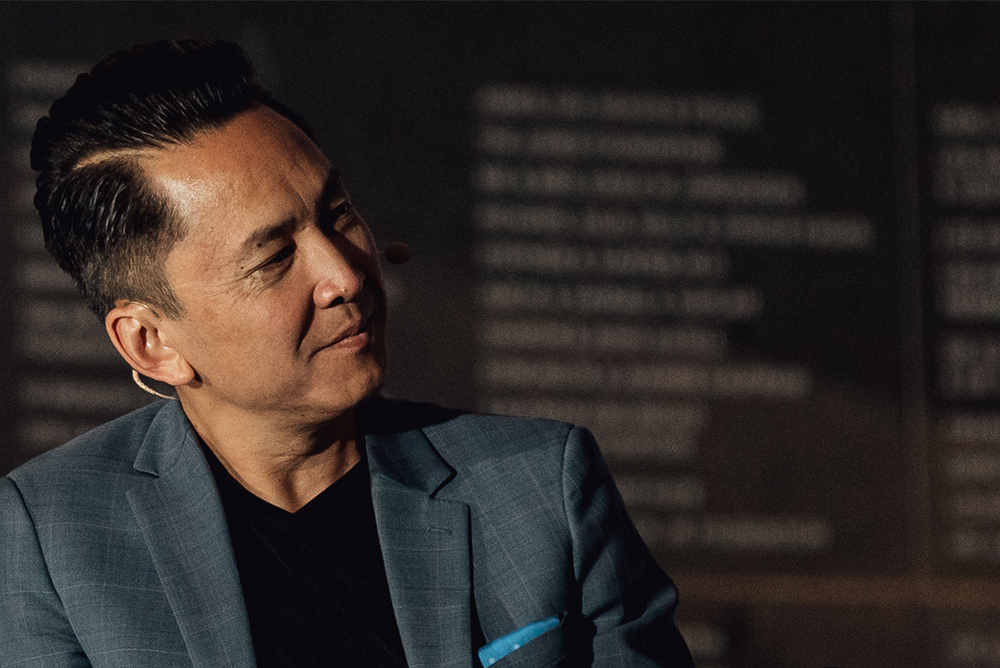
Photo by Chad Brady.
Viet Thanh Nguyen is a professor at the University of Southern California. His novel The Sympathizer won the Pulitzer Prize for Fiction, and he is also a recipient of fellowships from the Guggenheim and MacArthur Foundations. Before joining the Zócalo/The Music Center program “How Is Art A Weapon in War?,” Nguyen chatted with us in the green room about visiting the set of The Sympathizer, pho, and the best memorial about war.
What are three items you can’t live without?
Japanese whisky, my laptop, and a library—that’s kind of cheating, but.
What’s your favorite song, movie, show, or artwork about war?
I’ll pick a memorial instead. The best one I’ve ever visited was the Okinawa Prefectural Peace Memorial Museum, which includes a huge outdoor memorial, which has the name of everyone who died in the Battle of Okinawa. It includes Americans, Japanese, and Okinawans. It’s very rare to come across any kind of artwork, including memorials, that really does try to incorporate all sides, including civilians.
What is one book that you would want to see adapted on the small screen?
I’m a huge fan of this novel that no American has read called The Land at the End of the World by António Lobo Antunes, which is a major influence on The Sympathizer, and it’s about a Portuguese medic who has to go fight the Angola during their colonial war, which is their version of the Vietnam War. It’s an incredible novel and it’d make a great series.
What surprises you most about your life right now?
I’m a father and I’m enjoying it. I never thought I’d be a father. But in fact, I love and like my children and I actually have a lot of fun with them, and I actually learn a lot from them, emotionally. It’s good for me as a human being but it’s also been great to me as a writer to have access to another layer of emotions that I wouldn’t have access to.
If you were not in this current profession, what would you be doing instead?
I took the LSAT. I was an application away from going to law school.
If you could have a drink with any person, alive or dead, who would it be?
My paternal grandfather because I never met him. I never met any of my grandparents because of the war. My father clearly loved his father and all the stories I’ve heard about him from his sons and daughters are laudatory of him as a human being. My family originates, or at least two generations back, from the north of Vietnam in this rural area that even the Vietnamese think is rural and really poor. It was a tough life but he nevertheless built a compound, raised four children, lived until 92-93, saw the death of his wife. That’s a life of endurance and nobility and I would just want to talk to him.
What’s your favorite L.A. highway?
I sort of enjoy the Arroyo Seco Parkway. It’s part of the 110. I think it’s the first highway in L.A. and it feels like it because it’s only three lanes on either side and it’s a winding road.
Where’s your favorite spot to get pho in greater L.A.?
It’s on the border of El Monte and Rosemead call Phở Filet. You could’ve just airlifted this from Vietnam and put it in here, because you go in and deep southern Vietnamese is being spoken, a lot of Vietnamese people go there, the broth is some of the richest I’ve ever had.
I know you’ve visited the set of The Sympathizer. What was the most interesting thing you saw that surprised you?
It’s a scene with Robert Downey Jr. playing the Auteur, who is this notorious movie director, and Hoa Xuande as the Captain, the Sympathizer, and they’re having an intense conversation by the pool. To illustrate how eccentric the movie director was, the pool has an alligator in it, swimming around. I get there and I’m like, “Where’s the alligator?” “Well, there’s not going to be a real alligator, we’ll do VFX, digital effects, and put in an alligator.” That was interesting to see how these things are made and a lot of time what you see on the screen isn’t actually there.



